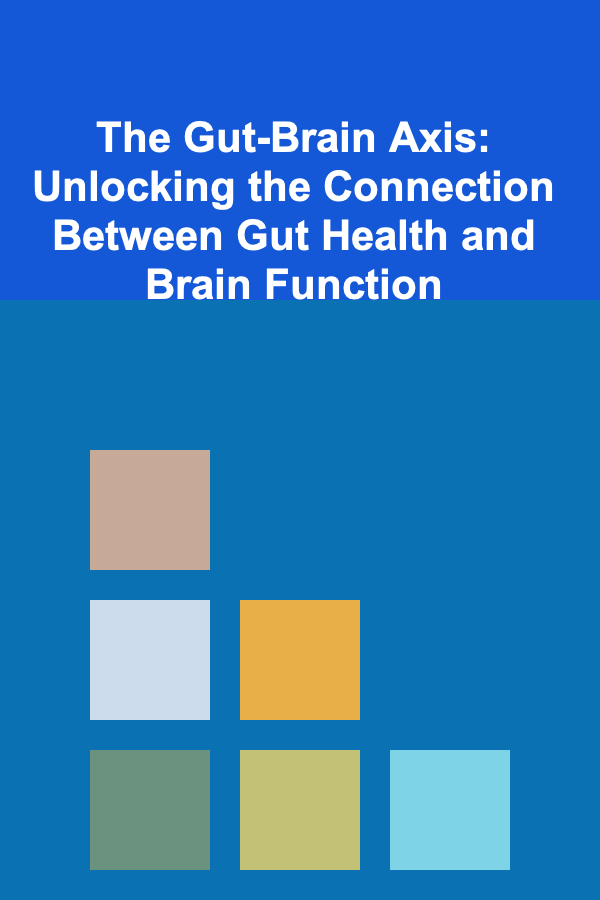
The Gut-Brain Axis: Unlocking the Connection Between Gut Health and Brain Function
ebook include PDF & Audio bundle (Micro Guide)
$12.99$8.99
Limited Time Offer! Order within the next:

For centuries, the gut and the brain have been viewed as separate entities, each with its own distinct functions. However, emerging research is revealing a complex and bidirectional communication network between these two vital organs, often referred to as the gut-brain axis. This intricate relationship plays a crucial role in regulating various physiological processes, including mood, cognition, and even neurodevelopmental disorders. Understanding the mechanisms underlying the gut-brain axis is essential for developing novel therapeutic strategies to promote both gut and brain health.
What is the Gut-Brain Axis?
The gut-brain axis is a bidirectional communication network consisting of the central nervous system (CNS), the enteric nervous system (ENS), the immune system, the endocrine system, and the gut microbiota. It's not a single pathway but rather a complex interplay of multiple signaling mechanisms that allow the gut and the brain to constantly influence each other. Think of it as a sophisticated two-way highway where information is continuously being exchanged.
- Central Nervous System (CNS): This includes the brain and spinal cord, acting as the command center for the body.
- Enteric Nervous System (ENS): Often referred to as the "second brain," the ENS is a complex network of neurons within the gut wall that controls gastrointestinal functions independently of the CNS, but also communicates with it.
- Immune System: The gut harbors a significant portion of the body's immune cells. Dysregulation of the gut microbiota can trigger immune responses that influence brain function.
- Endocrine System: The gut produces hormones, such as serotonin, which play a role in mood regulation. These hormones can enter the bloodstream and influence brain activity.
- Gut Microbiota: This is the vast community of microorganisms, including bacteria, viruses, fungi, and archaea, residing in the gastrointestinal tract. The composition and activity of the gut microbiota significantly influence the gut-brain axis.
Key Communication Pathways of the Gut-Brain Axis
Several key pathways facilitate the communication between the gut and the brain. These pathways involve various molecules and systems, including:
1. The Vagus Nerve
The vagus nerve is the longest cranial nerve in the body, acting as a direct communication link between the gut and the brain. It carries sensory information from the gut to the brainstem and relays motor commands from the brain to the gut. Approximately 80-90% of the fibers in the vagus nerve carry information from the gut to the brain. Gut microbes can influence vagal nerve activity through the production of various metabolites, such as short-chain fatty acids (SCFAs).
2. The Immune System
The gut is home to a significant proportion of the body's immune cells. The gut microbiota plays a critical role in shaping the immune system, and alterations in the gut microbiota composition can trigger immune responses that affect brain function. For instance, leaky gut (increased intestinal permeability) allows bacteria and their byproducts to enter the bloodstream, triggering systemic inflammation that can impact the brain.
Chronic inflammation, even at a low level, is increasingly being recognized as a major contributor to various mental health disorders, including depression and anxiety. The gut microbiota can modulate the production of pro-inflammatory cytokines (e.g., IL-1β, TNF-α) and anti-inflammatory cytokines (e.g., IL-10), thereby influencing the overall inflammatory state of the body and brain.
3. Short-Chain Fatty Acids (SCFAs)
SCFAs, such as acetate, propionate, and butyrate, are produced by gut bacteria through the fermentation of dietary fibers. These metabolites have numerous beneficial effects, including providing energy to colonocytes (cells lining the colon), strengthening the gut barrier, and modulating immune responses. SCFAs can also cross the blood-brain barrier and directly influence brain function.
- Butyrate: Is a primary energy source for colonocytes and helps maintain gut barrier integrity. It has also been shown to have neuroprotective effects, reducing inflammation and oxidative stress in the brain.
- Acetate & Propionate: These SCFAs can influence appetite regulation and energy metabolism, potentially impacting brain regions involved in these processes.
4. Neurotransmitters
The gut microbiota can produce and influence the production of various neurotransmitters, including serotonin, dopamine, and GABA. These neurotransmitters play critical roles in regulating mood, cognition, and behavior.
- Serotonin: Approximately 90% of the body's serotonin is produced in the gut. While serotonin produced in the gut doesn't directly cross the blood-brain barrier, it can influence brain function indirectly through vagal nerve stimulation and by influencing the availability of tryptophan, a precursor to serotonin, in the bloodstream.
- Dopamine: Certain gut bacteria can synthesize dopamine. While the extent to which this dopamine directly influences brain dopamine levels is still being investigated, its presence in the gut can affect gut motility and immune responses.
- GABA: Some gut bacteria produce GABA, an inhibitory neurotransmitter that helps to reduce anxiety and promote relaxation. Again, the direct impact on brain GABA levels is under investigation, but gut-derived GABA can influence the enteric nervous system.
5. The Hypothalamic-Pituitary-Adrenal (HPA) Axis
The HPA axis is a key neuroendocrine system that regulates the body's response to stress. Gut dysbiosis can activate the HPA axis, leading to increased cortisol production, which can have negative effects on brain function, including impaired cognition and increased anxiety.
Chronic stress and activation of the HPA axis can also disrupt the gut microbiota, creating a vicious cycle of gut-brain dysregulation.
How Gut Health Affects Brain Function: Specific Examples
The impact of gut health on brain function is far-reaching and implicated in a wide range of neurological and psychiatric conditions. Here are some specific examples:
1. Mood Disorders (Depression & Anxiety)
The gut microbiota has been strongly linked to the development and progression of mood disorders, such as depression and anxiety. Studies have shown that individuals with depression often have altered gut microbiota composition compared to healthy individuals. Specific bacteria have been associated with either pro-depressive or anti-depressive effects.
- Mechanism: Dysbiosis can lead to increased inflammation, altered neurotransmitter production, and HPA axis dysregulation, all of which contribute to the pathophysiology of depression and anxiety.
- Research: Animal studies have demonstrated that transferring gut microbiota from depressed individuals to healthy animals can induce depressive-like behaviors in the recipient animals. Similarly, fecal microbiota transplantation (FMT) has shown promise in alleviating depressive symptoms in some human trials.
2. Neurodevelopmental Disorders (Autism Spectrum Disorder - ASD)
A growing body of evidence suggests a connection between gut health and neurodevelopmental disorders, particularly Autism Spectrum Disorder (ASD). Many individuals with ASD experience gastrointestinal issues, and alterations in gut microbiota composition have been observed in this population.
- Mechanism: Gut dysbiosis may contribute to ASD by increasing inflammation, disrupting the gut barrier, and altering the production of neuroactive metabolites. These factors can influence brain development and function.
- Research: Studies have shown that interventions aimed at improving gut health, such as dietary changes and probiotic supplementation, may help to alleviate some of the symptoms associated with ASD.
3. Neurodegenerative Diseases (Alzheimer's Disease & Parkinson's Disease)
The gut-brain axis is increasingly implicated in the pathogenesis of neurodegenerative diseases, such as Alzheimer's disease (AD) and Parkinson's disease (PD). Alterations in the gut microbiota composition and increased intestinal permeability have been observed in individuals with these conditions.
- Alzheimer's Disease: Amyloid plaques, a hallmark of AD, can trigger inflammation in the brain. Leaky gut can exacerbate systemic inflammation, indirectly contributing to neuroinflammation and disease progression. Specific gut bacteria may also influence the production of amyloid proteins.
- Parkinson's Disease: Emerging research suggests that gut dysbiosis may play a role in the aggregation of alpha-synuclein, a protein that accumulates in the brains of individuals with PD. Constipation is a common symptom of PD, and its severity often correlates with disease progression, suggesting a link between gut function and the disease. Furthermore, some research points to a potential role for specific gut bacteria in the development of motor symptoms in PD.
4. Cognitive Function
The gut microbiota can influence cognitive function, including memory, learning, and attention. Studies have shown that alterations in gut microbiota composition can impair cognitive performance in both animals and humans.
- Mechanism: Gut dysbiosis can disrupt the production of neurotransmitters, alter brain-derived neurotrophic factor (BDNF) levels, and increase inflammation, all of which can negatively impact cognitive function. BDNF is crucial for neuronal survival, growth, and plasticity, and its levels are often reduced in individuals with cognitive impairment.
- Research: Probiotic supplementation has been shown to improve cognitive function in some studies, particularly in elderly individuals. These improvements may be related to changes in gut microbiota composition and reduced inflammation.
Factors Influencing Gut Health and the Gut-Brain Axis
Numerous factors can influence the composition and function of the gut microbiota and, consequently, the gut-brain axis. These factors include:
1. Diet
Diet is a major determinant of gut microbiota composition. A diet rich in fiber, fruits, and vegetables promotes the growth of beneficial bacteria, while a diet high in processed foods, sugar, and saturated fats can lead to dysbiosis.
- Fiber: Provides fuel for beneficial bacteria, leading to the production of SCFAs.
- Prebiotics: Non-digestible food ingredients that promote the growth of beneficial bacteria. Examples include fructooligosaccharides (FOS) and inulin.
- Probiotics: Live microorganisms that, when administered in adequate amounts, confer a health benefit on the host. Sources include fermented foods (e.g., yogurt, kefir, sauerkraut) and supplements.
- Processed Foods: Often high in sugar and unhealthy fats, which can promote the growth of harmful bacteria and contribute to inflammation.
2. Antibiotics
Antibiotics can have a profound impact on the gut microbiota, often leading to dysbiosis and reduced microbial diversity. While antibiotics are sometimes necessary for treating bacterial infections, their overuse can have negative consequences for gut health and the gut-brain axis.
Antibiotic-induced dysbiosis can disrupt the balance of the gut microbiota, allowing opportunistic pathogens to flourish and potentially leading to long-term health problems. It's essential to use antibiotics judiciously and consider strategies to restore the gut microbiota after antibiotic treatment, such as probiotic supplementation.
3. Stress
Chronic stress can negatively impact the gut microbiota, leading to dysbiosis and increased intestinal permeability. The HPA axis activation in response to stress can also disrupt the gut-brain axis.
Stress management techniques, such as mindfulness meditation, yoga, and deep breathing exercises, can help to mitigate the negative effects of stress on the gut microbiota and brain function.
4. Age
The gut microbiota changes throughout life, with significant shifts occurring in infancy, childhood, and old age. Age-related changes in the gut microbiota can influence brain function and increase the risk of age-related neurological disorders.
Maintaining a healthy lifestyle, including a balanced diet and regular exercise, can help to support gut health and brain function throughout the lifespan.
5. Genetics
Genetic factors can also influence the composition of the gut microbiota and the susceptibility to gut-related disorders. However, the influence of genetics on the gut microbiota is complex and interacts with environmental factors.
Strategies to Improve Gut Health and Support Brain Function
Given the close connection between gut health and brain function, strategies aimed at improving gut health can have a positive impact on cognitive function, mood, and overall well-being. Here are some evidence-based strategies:
1. Adopt a Gut-Friendly Diet
Focus on consuming a diet rich in fiber, fruits, vegetables, and fermented foods. Limit processed foods, sugar, and saturated fats.
- Increase Fiber Intake: Aim for at least 25-30 grams of fiber per day from sources such as whole grains, legumes, fruits, and vegetables.
- Include Fermented Foods: Incorporate fermented foods like yogurt, kefir, sauerkraut, kimchi, and kombucha into your diet to provide a source of probiotics.
- Eat a Variety of Plant-Based Foods: Different plant-based foods contain different types of fiber and prebiotics, which can support a diverse and healthy gut microbiota.
- Limit Processed Foods and Sugar: These foods can promote the growth of harmful bacteria and contribute to inflammation.
2. Consider Probiotic and Prebiotic Supplementation
Probiotic supplements can help to restore the balance of the gut microbiota, particularly after antibiotic treatment. Prebiotic supplements can provide nourishment for beneficial bacteria.
- Choose a High-Quality Probiotic: Look for a probiotic supplement that contains multiple strains of beneficial bacteria and a high CFU (colony-forming units) count.
- Consider Prebiotics: Prebiotics, such as FOS and inulin, can help to promote the growth of beneficial bacteria in the gut.
- Consult with a Healthcare Professional: It's always best to consult with a healthcare professional before starting any new supplement regimen, especially if you have underlying health conditions.
3. Manage Stress
Practice stress management techniques, such as mindfulness meditation, yoga, and deep breathing exercises, to reduce the negative impact of stress on the gut microbiota and brain function.
- Mindfulness Meditation: Can help to reduce stress and anxiety, and promote a sense of calm and well-being.
- Yoga: Combines physical postures, breathing techniques, and meditation to reduce stress and improve overall health.
- Deep Breathing Exercises: Can help to activate the parasympathetic nervous system, which promotes relaxation and reduces stress.
4. Get Enough Sleep
Adequate sleep is essential for both gut health and brain function. Aim for 7-8 hours of quality sleep per night.
Sleep deprivation can disrupt the gut microbiota and impair cognitive function. Establishing a regular sleep schedule and creating a relaxing bedtime routine can help to improve sleep quality.
5. Engage in Regular Exercise
Regular physical activity can have a positive impact on both gut health and brain function. Aim for at least 30 minutes of moderate-intensity exercise most days of the week.
Exercise can help to increase microbial diversity in the gut and improve cognitive function. Choose activities that you enjoy and that fit into your lifestyle.
6. Limit Antibiotic Use
Use antibiotics only when necessary and under the guidance of a healthcare professional. Consider strategies to restore the gut microbiota after antibiotic treatment, such as probiotic supplementation.
The Future of Gut-Brain Axis Research
Research on the gut-brain axis is a rapidly evolving field, and new discoveries are constantly being made. Future research will likely focus on:
- Identifying specific gut bacteria that influence brain function.
- Developing targeted therapies to modulate the gut microbiota for the treatment of neurological and psychiatric disorders.
- Understanding the role of the gut-brain axis in neurodevelopmental disorders and neurodegenerative diseases.
- Developing personalized dietary recommendations based on individual gut microbiota profiles.
By continuing to unravel the complexities of the gut-brain axis, researchers hope to develop new and effective strategies to promote both gut and brain health, ultimately improving overall well-being.
Conclusion
The gut-brain axis is a complex and bidirectional communication network that plays a crucial role in regulating various physiological processes, including mood, cognition, and neurodevelopmental disorders. Understanding the mechanisms underlying the gut-brain axis is essential for developing novel therapeutic strategies to promote both gut and brain health. By adopting a gut-friendly diet, managing stress, and engaging in regular exercise, individuals can support a healthy gut microbiota and optimize brain function. As research continues to unravel the intricacies of the gut-brain axis, we can expect to see even more innovative approaches to promoting both gut and brain health in the future.
Reading More From Our Other Websites
- [Home Budget Decorating 101] How to Incorporate Greenery and Plants into Your Home Decor on a Budget
- [Ziplining Tip 101] Best Zipline Trails That Cross Iconic Historical Landmarks and Ruins
- [Home Pet Care 101] How to Train Your Dog to Follow Basic Commands
- [Survival Kit 101] How to Design a Tech‑Savvy Survival Kit for Digital Nomads on the Road
- [Home Family Activity 101] How to Plan Seasonal Outdoor Activities for Family Fun
- [Home Maintenance 101] How to Repair and Maintain Your Home's Hardwood Flooring
- [Home Holiday Decoration 101] How to Create a Cozy Fireplace Mantel Display for the Holidays
- [Gardening 101] Seasonal Soil Care: How to Amend and Mulch for Winter Survival
- [Home Cleaning 101] How to Maintain a Clean Home When You Have Small Children
- [Home Family Activity 101] How to Start a Family Garden in Your Backyard

How to Incorporate Toy Organization into Daily Routines
Read More
How to Market Your Home Music Lessons to Local Students
Read More
How To Draw Fantasy Maps and Worlds
Read More
How to Create a Business Budget: A Comprehensive Guide
Read More
Building a Skincare Routine for Teenagers: A Comprehensive Guide
Read More
How to Create a Personalized City Exploration Challenge
Read MoreOther Products

How to Incorporate Toy Organization into Daily Routines
Read More
How to Market Your Home Music Lessons to Local Students
Read More
How To Draw Fantasy Maps and Worlds
Read More
How to Create a Business Budget: A Comprehensive Guide
Read More
Building a Skincare Routine for Teenagers: A Comprehensive Guide
Read More